The Intel Optane SSD 900p 480GB Review: Diving Deeper Into 3D XPoint
by Billy Tallis on December 15, 2017 12:15 PM ESTAnandTech Storage Bench - The Destroyer
The Destroyer is an extremely long test replicating the access patterns of very IO-intensive desktop usage. A detailed breakdown can be found in this article. Like real-world usage, the drives do get the occasional break that allows for some background garbage collection and flushing caches, but those idle times are limited to 25ms so that it doesn't take all week to run the test. These AnandTech Storage Bench (ATSB) tests do not involve running the actual applications that generated the workloads, so the scores are relatively insensitive to changes in CPU performance and RAM from our new testbed, but the jump to a newer version of Windows and the newer storage drivers can have an impact.
We quantify performance on this test by reporting the drive's average data throughput, the average latency of the I/O operations, and the total energy used by the drive over the course of the test.
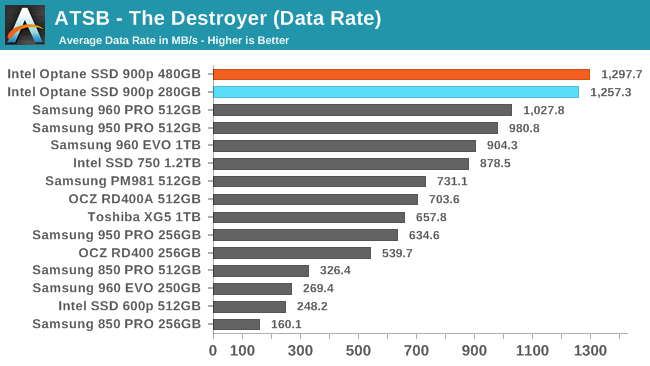
The average data rate of the 480GB Optane SSD 900p on The Destroyer is a few percent higher than the 280GB model scored, further increasing the lead over the fastest flash-based SSDs.
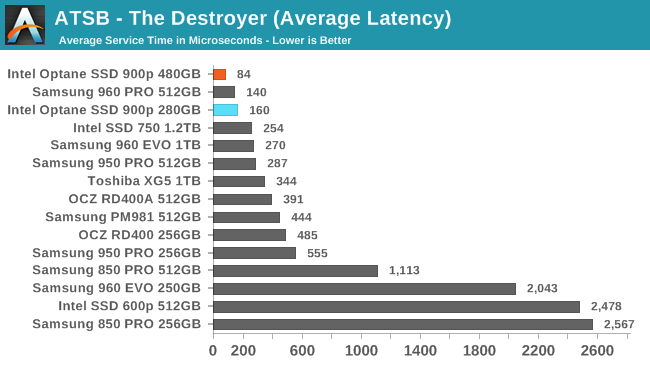
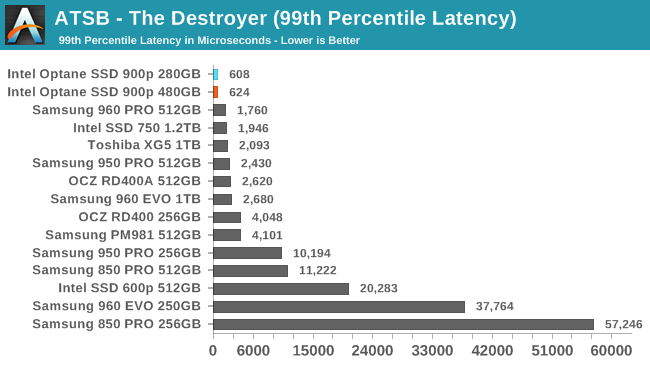
The 480GB Optane SSD 900p shows a substantial drop in average latency relative to the 280GB model, allowing it to score better than any flash-based SSD. For 99th percentile latency the 480GB model scores slightly worse than the 280GB, but both are still far ahead of any competing drive.
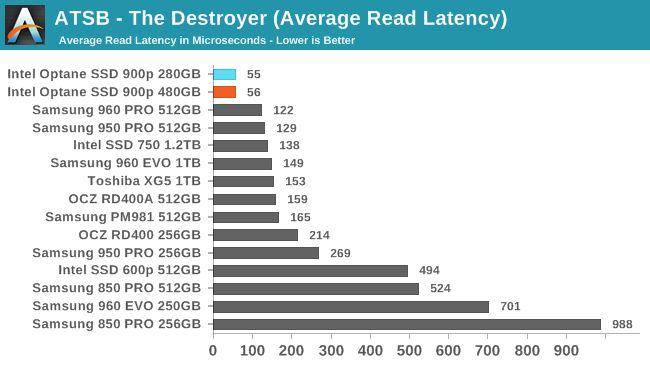
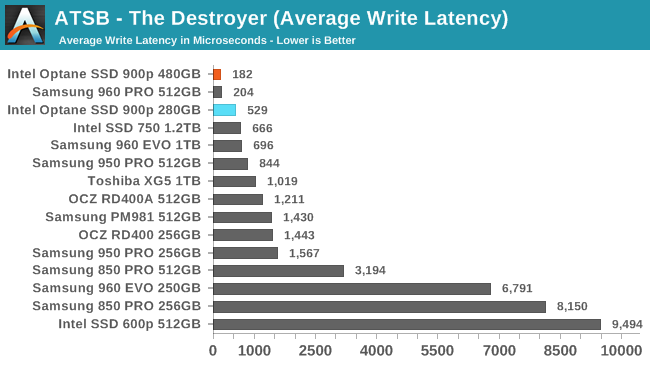
The two capacities of Optane SSD 900p have essentially the same average read latency that is less than half that of any flash-based SSD. For average write latency, the 480GB model sets a new record while the 280GB performed worse than it did the first time around, but still faster than anything other than the Samsung 960 PRO.
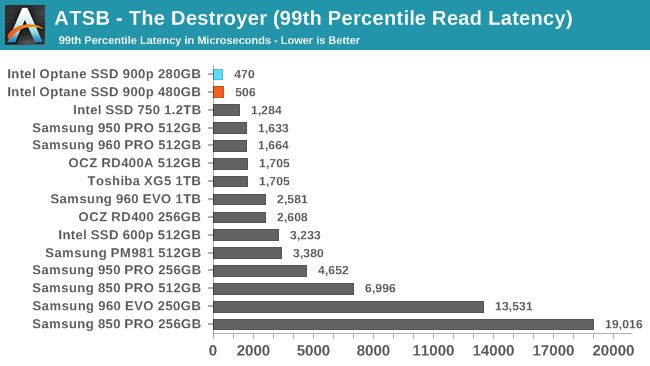
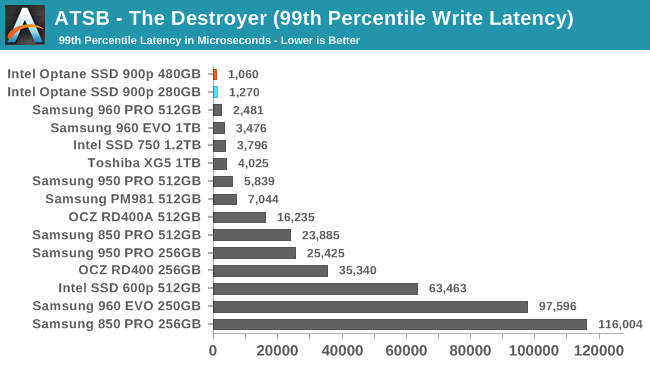
The 99th percentile read and write latency scores for the Optane SSD 900p are all substantially better than any flash-based SSD, even though the 280GB's results again show some variation between this test run and our original review. The 99th percentile read latency scores are particularly good, with the Optane SSDs around 0.5ms while the best flash-based SSDs are in the 1-2ms range.










69 Comments
View All Comments
Billy Tallis - Friday, December 15, 2017 - link
The ATSB tests are Windows-based, and the synthetic tests are on Linux with fio. I can't really create a RAM disk large enough to properly run the ATSB tests (at least not on this system), but I'll look into running the synthetic tests against a RAM disk.tuxRoller - Saturday, December 16, 2017 - link
Thanks so much for the response and clarification.I'll keep an eye out for that ramdisk comparison:)
Chaser - Friday, December 15, 2017 - link
In other words, if you are the enthusiast gamer person like many of the people that read this site, you're throwing money away buying this for your gaming system.jabber - Friday, December 15, 2017 - link
You are pretty much throwing away money investing in anything faster than a 850EVO in a gaming rig.eek2121 - Sunday, December 17, 2017 - link
Not really, as a gamer, you should not only be looking at performance, but at reliability as well. Ironically I say this NOT because the 8xx EVO is crap (my 840 evo still has 93% life left and that's despite being used as a system drive for many years), but because my 960 evo has had a metric ton of degradation in the 6 months I've owned it.Klimax - Sunday, December 17, 2017 - link
Only if one has few games. There's better solution: 16GB of RAM + large regular HDD (WD Black and similar, their sequential reads are very good). Only initial load will be noticeable. (Anytime after that, caching will take care of that)CheapSushi - Friday, December 15, 2017 - link
Umm, what? Optane would be the better drive in every single way for OS and general usage. If you were going to get ONE main drive, it should be Optane.ddriver - Friday, December 15, 2017 - link
Sure, but is 0.01% faster in real world performance worth being 300$ more expensive? If you are going with one main drive, you better get better capacity than performance you can't make any use of.tricomp - Saturday, December 16, 2017 - link
Here is what Tom wrote about Optane OS drive : "You will see and feel a performance benefit just by using the Optane SSD 900P as your operating system drive. The feel of the system changes even if you’re replacing a high-performance NVMe SSD. You will notice the increased responsiveness immediately and then gradually become accustomed to it. In our experience, you will take the performance for granted until you work on a slower PC. Then you'll wish it had an Optane SSD." Its main advantage - 4K read performance - makes it OS kingeek2121 - Sunday, December 17, 2017 - link
"Tom" has been gone for a long time. Tom's hardware, much like AnandTech, has simply become a vehicle for Purch Ads (sadly). The AnandTech or Tom's Hardware of today have absolutely nothing to do with the original founders/sites. I don't mean to sound anti-corporate (because I'm not), but Purch has allowed pretty much all of their sites to degrade to the point where they have become irrelevant. I mean no disrespect to any AT folks either. I'm sure they bust their asses off. However, IMO, Purch has taken some very valuable brands and driven them into the ground in a desperate reach for revenue.